
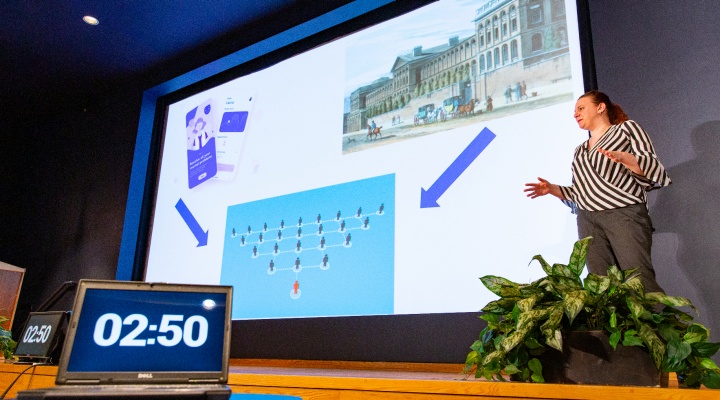
In this Issue:
Support your Department
Emily Bowlus-Peck presenting her PhD dissertation research during the 3MT Competition at UB.
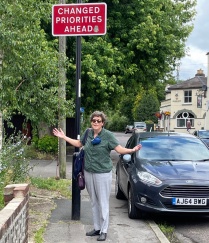
Dear Friends of UB History,
As I write this, I have served as History Department chair for two weeks and am just discovering some of the pleasures and difficulties I will experience over the next few years. I am thankful that colleagues across the university and beyond have offered their support and encouragement. I am particularly grateful for the generous help received from our previous chair, Erik Seeman, who worked tirelessly to bring the department through the pandemic as smoothly as possible under very difficult circumstances
The department welcomes two new faculty colleagues this fall: Hani Khafipour and Robin Mitchell, who are featured in this newsletter. Our departmental staff—Michelle Burger, Amie Schirching, and Shayna Devlin—have been essential to our work of recovery and innovation. Michelle has spearheaded the transformation of our workspaces and seminar room to make them more serviceable and attractive. Support from our alumni and other friends helped make that possible. In her role managing the graduate programs, Amie has worked hard to welcome our new students and make them feel at home, including the increasing number of students who earn a History BA and Masters of Education in the five-year “UB Teach” program. In addition to managing our social media accounts, Shayna has launched a career planning series for our majors. She also set up a new listserv to share information about departmental events. Please visit the Department of History events website and sign up. We’d love to see you at the many in-person and online talks the department sponsors.
The photo you see on this page was taken in early July in Southampton, England, during a family trip. When I first saw this sign, my mind immediately turned to how my academic life would change given my new role in the department. A different significance emerged two days later, though, when I tested positive for Covid. Several days of quarantine in a tiny room in London forced me to reflect on the fact that the pandemic is by no means over. We are still adjusting—trying to turn lemons into lemonade by using the power of online learning to our benefit while recreating a sense of shared purpose by getting together as much as possible to talk about history and share our passion for it with our students.
Thanks for your interest in and support for the department. I hope you will get in touch with me if you’d like to discuss our work. Talking with alumni and other friends of the department is sure to be one of the pleasures of my new position.
Best wishes,
Kristin Stapleton
Professor and Chair
Going Digital
Over the past 20 years, the field of Digital Humanities (DH- the intersection of computing and digital technologies with the study of the humanities) has made a significant impact on academic scholarship. UB’s Department of English recently launched a Minor in Digital Humanities, and students and faculty all over the College of Arts and Sciences utilize DH methodologies and tools. The Department of History also boasts a burgeoning band of digital historians.
This past year, Hannah Griffith completed the Department of History’s first DH MA thesis. Rather than write a traditional thesis Hannah built a website, "Yenna Come Nyam: Gullah Geechee Histories and Storytelling Through Food," to better illustrate her exploration of Gullah Geechee foodways. Hannah uses the website as a way to have the oral histories from chefs and academic analysis more easily in conversation with each other.
Like many entering the DH foray, Hannah had little previous experience with the digital medium she ultimately used. With help from her brother, she built the website, and hopes that others will find it, carry on what she started, and continue to expand this fascinating project.
Interest in applying DH methodologies is not limited to our graduate students. In Prof. Claire Schen’s HIS 390 Plagues and Pandemics course in Spring 2022, the students investigated the typhoid outbreak of 1843 in the town of North Boston, NY. In a collaborative class project the students and Prof. Schen created the Typhoid in North Boston, NY 1843: Small Town Big Story website. The website uses text, images, and maps to tell the story of the outbreak in North Boston.
Students took different roles to complete this project. Sophomore Kate Stiglmeier described her contribution locating the elusive records of those affected by the pandemic as, “Dr Flint [the examining physician] never identified the families and who exactly was affected. He only listed the head of the household. Some of my classmates and I looked at old census records in an attempt to identify the names of the children and wives. The lack of records they had was actually very surprising… Finding these names was much harder than I thought it would be but fascinating at the same time.”
When reflecting on her experience in HIS 390, Kate said, “I think that the most important thing I took from this experience is that there are multiple ways to do research and even more ways to present it. This was such a cool way to present the research we did.”
The project even caught the attention of the town of North Boston itself, and was featured in their press release detailing the installation of a new historical marker related to the typhoid outbreak.
Five years ago, UB launched a new teachers’ education initiative, UB Teach. Students in the UB Teach program earn a combined degree, a BA in their chosen field of teaching and a Master’s in Education in 5 years. History is one of 17 subject options for UB Teach (History BA/Social Studies Education EdM), but one that has exploded in popularity. As of Fall 2022 there are 116 students in the History UB Teach program–over 25% of the total program population!
Russel Bassarath (pictured to the right), a 2022 UB Excellence in Research, Scholarship and Creativity Award winner for his History Honors Thesis, is a History UB Teach student. Russel is currently in his senior year. Due to the structure of the UB Teach program this means Russel is completing his History BA while also beginning graduate classes for his EdM. When Russel began at UB, the UB Teach program was still in its infancy, but he found that it was a good fit for him. Russel said UB Teach drew him in because, “I knew I wanted to teach starting in high school. I just didn't know it would be in history.”
The UB Teach students are enthusiastic about History and about becoming impactful educators. Russel is most looking forward to, “providing opportunities for my students in terms of looking at more than the bigger picture or teaching towards like the curriculum and the standards…I think for me it would be specifically looking at the 1950s, in the Civil Rights movement, how we're only learning about black men, and leadership positions, as opposed to black women who had same amount of influence in society. The information is there. We can teach it. We can't teach a complete or thorough explanation of the Civil Rights movement without mentioning organizations like the Women’s Political Council, that's just something that drove me into wanting to teach-to provide more opportunities for students to engage with and learn the material, more than is being shown right now.”
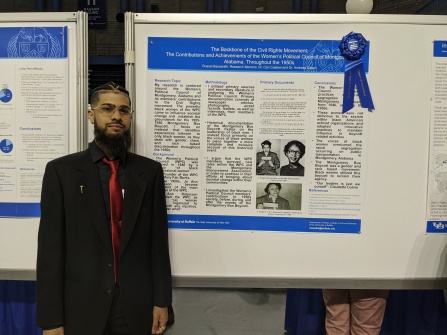
Russel Bassarath presenting his award-winning History Honor’s Thesis.
Prof. Mike Rembis
The University at Buffalo Center for Disability Studies is looking forward to embarking on its 13th year of operation under the leadership of its Director, Prof. Mike Rembis, and its new Associate Director, Prof. Jenifer Barclay. The Center, which has been fortunate to take on new affiliated faculty and faculty advisors, will continue its virtual working group, hosted by the Consortium for the History of Science, Technology, and Medicine, as well as its robust local programming schedule. Prof. Leslie Reagan from the University of Illinois will be visiting in November to give the Center’s annual Veterans Day lecture. The Center will also continue its work on creating the first-ever Journal of Disability History and expanding its ongoing oral history project. The Center continues to welcome students into its interdisciplinary Master’s degree and Graduate Certificate programs.
Meet the New Faculty
The department is excited to introduce two new faculty members, Robin Mitchell, Distinguished Visiting Scholar, and Hani Khafipour, Assistant Teaching Professor.
Robin Mitchell is an award-winning Associate Professor in History at California State University, Channel Islands. She is a 19th century French historian, specializing in discourses about race, gender, and sexuality. She received her master’s degree in Late Modern European History from the University of California, Santa Cruz, and her doctorate in Late Modern European History from the University of California, Berkeley, with a Designated Emphasis in Women, Gender, and Sexuality. Her work focuses on the white colonial fantasies, scandals, and crime imposed upon Black women’s bodies and voices when they were in metropolitan French spaces. In addition to mentoring duties at UB, Mitchell will focus during her time writing the biography of Suzanne Simone Baptiste, also known as Madame Toussaint Louverture. It is currently under contract with Princeton University Press. Mitchell is prolific on Twitter (@ParisNoire), frequently musing about French shoes, French history, and all things related to academia.
Hani Khafipour’s passion for history and literature began at an early age in Shiraz, where he was introduced to medieval Persian poetry and Iran’s ancient history. Later, much later, as a historian of Iran and the Middle East, he became deeply fascinated with Sufism (Islamic mysticism) and its connections to political theology during the early modern period, an era of great sociopolitical and religious transformations—the age of the great Eurasian Empires. His research and publications are focused on the intellectual history and political culture of Iran during this period. His forthcoming book, The Mantle of the Sufi Kings: Political Theology in Early Modern Iran, focuses on the rise and transformation of the Safavid dynasty (1501-1722) from an unknown mystical order to a powerful Shi'a empire that reshaped the geopolitical landscape of the Middle East. He teaches courses on the history and literature of Iran and the Middle East.
Professor Susan Cahn Retires
Prof. David Herzberg
Susan Cahn retired last year and she is already missed.
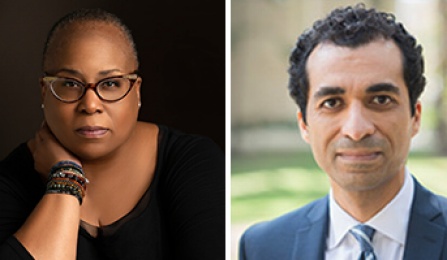
Distinguished Visiting Scholar Robin Mitchell (left) and Clinical Assistant Professor Hani Khafipour (right).
Beyond her scholarship, Susan is—argh, was—the best of colleagues. She is smart and courageous about the issues we faced as a department, and always perceptive about how our decisions could impact students and others at and beyond the university. She bent our deliberations towards doing good, or at least not doing harm, with pragmatic intelligence, moral gravity, and a sneakily hilarious wit. When we listened to her we were better for it.
Given all these qualities it’s probably not surprising that Susan is also a terrific, even profound, teacher. I think it has something to do with her genius for listening. She is not a broadcaster, waiting impatiently to impart the smart remark she has already decided to say. She listens intently because she is genuinely curious about what others think. Even—or maybe even especially—students. She meets them where they are and by engaging with them seriously and respectfully, helps them to move forward in the direction of their own intellectual ambitions. Because we often worked with the same students I’ve seen it happen many times and I’m telling you, it’s magical.
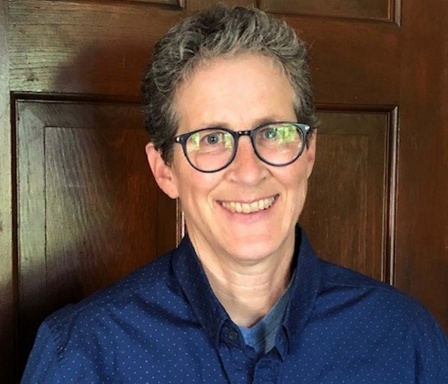
I’m sure it wasn’t always easy to have been one of the few women faculty—studying women’s and lesbian/gay history no less—hired into what was still largely an old boys’ club. Carrying that burden came with costs. But Susan held her own with dignity, integrity, solidarity, courage, and also warmth and good humor. If I could be like any academic I would want to be like her. Thanks, Susan. See you around town.
Jenifer Barclay’s 2021 book publication, The Mark of Slavery: Disability, Race, and Gender in Antebellum America, was discussed by UBNow. Prof. Barclay was also named the Associate Director of the Center for Disability Studies at UB.
Cari Casteel, clinical assistant professor of history, was featured in a UBNow article detailing her research into the history of deodorant. In Fall 2021, Prof. Casteel and media artist Paul Vanouse collaborated on an interdisciplinary demonstration and conversation open to the public called "Nostalgia for Armpit Goats? Body Oder and Biopower." Prof. Casteel is also the new advisor for UB’s Phi Alpha Theta chapter.
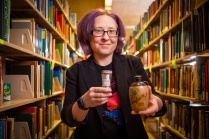
Prof. Cari Casteel.
Carole Emberton published a new book, To Walk About in Freedom: The Long Emancipation of Priscilla Joyner in March 2022. The book is based upon an interview Joyner gave in the late 1930s in which she contemplated the meaning of freedom and the challenges she faced growing up as a mixed-raced girl in a white, slaveowning household. Reviewers have praised the books as an “insightful, poignant consideration of a representative figure’s negotiation of liberty in the decades after Emancipation” (Kirkus) and “a must-read for anyone interested in seeing … the nation’s racial past in a fresh light” (Heather Ann Thompson). Emberton has given talks on the book at the Buffalo History Museum, the Boston Public Library, and Politics & Prose.
Sarah Handley-Cousins was an American Council of Learned Societies Fellow for 2022. Prof. Handley-Cousins was honored during the UB Celebration of Faculty & Staff Academic Excellence. She was 1 of 2 faculty in the university honored for winning a highly prestigious fellowship!
David Herzberg’s book White Market Drugs won the Rorabaugh Prize awarded by the Alcohol and Drug History Society. He continued to serve as Editor at the Social History of Alcohol and Drugs and developed a pending new interdisciplinary Masters program at UB on drug use and addiction tentatively titled Drugs, Health, and Society. His co-authored book on whiteness and opioids (with Helena Hansen and Jules Netherland) will be published in March 2023. He recently began work on a new book project on the history of physicians and addiction.
Hal Langfur received a grant from the Brazilian government, reactivated after pandemic delays, to serve as a visiting scholar at the Universidade Federal Fluminense in greater Rio de Janeiro. During his month-long stay, he conducted research on a new project at the National Library and gave a talk about his forthcoming book, Adrift on an Inland Sea: Misinformation and the Limits of Empire in the Brazilian Backlands. The book will be published by Stanford University Press in January 2023. At the annual European Rural History conference in Uppsala, Sweden, he presented a paper on the contest between scientific and local knowledge in the Brazilian interior during the decades preceding the country’s independence from Portugal in 1822. During the fall semester, he enjoyed teaching a new seminar for first-year students, “Race and Gender in Another America,” focused on colonial Latin America.
Yan Liu gave a number of talks in North America and Asia based on his book Healing with Poisons: Potent Medicines in Medieval China published in June 2021, including at Academia Sinica, Duke University, and Fudan University, Shanghai. He is working with a translator to publish the book in Chinese in Spring 2023. He is making progress on his second book project, which examines a global history of aromatics in medieval China. He is co-editing a volume with Hsiao-wen Cheng and Margaret Ng tentatively titled "Global Lives of Medicines: Materials, Markets, and Practices across Asia," in which he contributes an article on the history of camphor in medieval China. He presented drafts of the article at the Association for Asian Studies Annual Conference in Honolulu; the Objects, Images, and Spaces of Health Working Group; and a workshop on the edited volume at the University of Pennsylvania.
Ndubueze Mbah has received a $20,000 grant from the Wenner-Gren Foundation to support research on his second monograph. He was selected as a 2022-2023 Harvard Radcliffe Institute Fellow. In Spring 2022 the Baldy Center Magazine highlighted his research on the use of forgery by those fighting for their own vision of freedom in West Africa.
Patrick McDevitt was named the new Director of the UB Honors College.
Dalia Muller continues work on her wide-ranging Impossible Project. This past year one of the projects within the Impossible Project was the “Making Computing Anti-Racist Student Solution Competition.” In this competition 120 first-year computer science majors proposed their ideas for making computing anti-racist. She also discussed the Impossible Project and pedagogy in a podcast with Ramona Houston. Prof. Muller is also a 2022-2023 Humanities Institute Fellow.
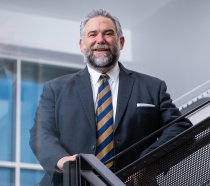
Patrick McDevitt, associate professor of history and academic director.
Mike Rembis, in addition to his other work, has embarked on a new collaboration with the National Human Genome Research Institute. He has served as a consultant on their “talking dictionary.” He has participated in two widely attended public meetings, The Meaning of Eugenics: Historical and Present-Day Discussions of Eugenics and Scientific Racism and Roundtable Discussion: "Does genetic and genomic screening keep open the door to eugenics?". This fall, he will co-direct the two-day symposium, Irreducible Subjects: Disability and Genomics in the Past, Present and Future, which will lead to the publication of a book of the same title. In 2022, Professor Rembis was also selected to be the lead editor and author on the New York City Department of Education Hidden Voices project, Perspectives of Americans with Disabilities.
While finishing his last year as Department Chair, Erik Seeman completed three chapters for edited collections: “Shakers and the Protestant Cult of the Dead,” for a volume on the Shaker religious revivals of the 1830s and 1840s; “Poverty and Prosperity in Boston’s 1721 Smallpox Epidemic,” for a book on epidemics in colonial North America; and “Deathbed Scenes in the Early Modern Atlantic World: Cross-Cultural Perspectives,” for a volume on early modern deathbed practices. Collaboration on the latter collection is the foundation for a Fulbright Fellowship that Seeman received to teach and research in Erfurt, Germany, in Spring 2023.
Kristin Stapleton published The Modern City in Asia, an entry in the Cambridge Element Global Urban History Series. In it, she analyzes how concepts and practices associated with the “modern city” were received, transformed, and contested in Asia over the past 150 years. Over the next year she will attend several conferences to discuss her arguments and, in collaboration with other scholars in the field of global urban history, extend the discussion to the question of how Asian cities and Asian thinking about cities shaped and are shaping Euro-American conceptions of urban modernity.
Camilo Trumper presented "Dictatorship’s Children: Education, Repression and Protest among Youth in Chile,” during the Spring 2022 Scholars@Hallwalls Speakers series.
Victoria W. Wolcott published her third book, Living in the Future: Utopianism and the Long Civil Rights Movement, with the University of Chicago Press in April. She is currently working on an edited collection, Utopian Imaginings: Saving the Future in the Present, for SUNY Press’s “Humanities to the Rescue” series. She has been doing lots of podcasts to promote the new book and has been talking to reporters about her research on recreational segregation. After two years of isolation, she is looking forward to attending conferences in person in the coming academic year.
Gene Zubovich, published his first book, titled Before the Religious Right: Liberal Protestants, Human Rights and the Polarization of the United States in March 2022. During the 2021-22 academic year, he was a residential fellow at the Kluge Center at the Library of Congress in Washington DC. He spoke about his book with audiences at the Library and George Washington University, as well as several journals and podcasts. He also discussed the history of religion and politics in the Washington Post and on NPR. At the Library of Congress, Prof. Zubovich began research on his new book project, tentatively titled A Global History of the US Culture Wars. An article based on his new research on the US culture wars in Mozambique has been accepted for publication in the Journal of American History.
Katherine Zubovich, spent the 2021-22 academic year at the Kennan Institute of the Woodrow Wilson International Center for Scholars in Washington D.C, where she was the James H. Billington Fellow in Russian history and culture. While in D.C., she did research at the Library of Congress for her current project on Soviet visual statistics. She also presented her work-in-progress at American University, Georgetown University, and at the Kennan Institute. In October 2021, Zubovich attended the award ceremony and dinner in London for the Pushkin House Russian Book Prize, for which her book Moscow Monumental was shortlisted. This event was the highlight of her year and although Moscow Monumental did not win the prize, it was an enormous honor to be a finalist. In December 2021, Moscow Monumental was named one of Foreign Affairs magazine’s Best Books of 2021.
Helju Bennett died November 11, 2021. Prof. Bennett taught Russian history in the department from 1973 until the late 1990s. Colleagues remember her and her work:
“Although we only worked together a few years at the beginning of my career and the end of hers, I will always remember her collegiality, her warm hospitality, and her welcoming smile.”
-Patrick McDevitt
“I didn’t have the chance to meet Helju, sadly, but I assign her wonderful chapter on Peter the Great’s Table of Ranks in my Imperial Russia class. I will continue to teach it as a tribute to her.”
-Katherine Zubovich
“Helju attended for several years, until 2019, and purely out of interest, my Modern European Core class. Students loved her, and she mingled easily with them due to her soft, kind demeanor. She shared with us her knowledge of Russian and Baltic history, and we greatly profited from her expertise. We will all fondly remember her.”
-Andreas Daum
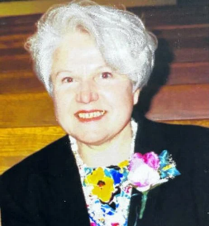
Prof. Helju Bennett.
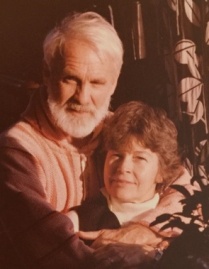
Prof. Orville Murphy with his wife Martha Nichols.
Orville Murphy died January 9, 2022. After a period in the US Navy during World War II, he completed his PhD. Prof. Murphy began working at UB in 1966. He was a French Historian. Among his publications were Charles Gravier, Comte de Vergennes: French Diplomacy in the Age of Revolution, 1719-1787, winner of the 1982 Gilbert Chinard Book Prize, and The Diplomatic Retreat of France and Public Opinion on the Eve of the French Revolution, 1783-1789. Prof. Murphy retired from UB as a Distinguished Professor in 1991. During his retirement Prof. Murphy reignited his love of music and played his Old Time Harmonica around the Pacific Northwest, where he retired. Students and colleagues fondly remember Prof. Murphy’s kindness and sound advice.
John Naylor passed away on August 13, 2022. Prof. Naylor taught 19th and 20th century British History in the Department of History, as well as serving as the interim director of the UB libraries, and as treasurer for the North Atlantic Conference of British Studies. Prof. Naylor is fondly remembered by both colleagues and students. Former student Michael Klein writes on legacy.com, “I think of the Professor regularly, especially our political discussions. He touched many lives and was a genuine academic with an open and searching intellect. Though we may be shadows, as Tennyson reflects, I am glad to have passed some of my shadow time in company with the Professor.”
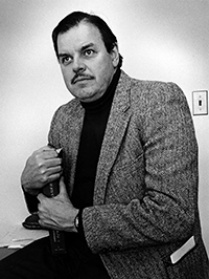
Prof. John Naylor.
History Dinner
In fall 2021, the Department of History kicked off a new initiative: once a semester, the chair and director of undergraduate studies will invite a group of up to ten students for an informal differ to chat, socialize, and enjoy our department’s community. The inaugural “History Dinner” took place on November 4, 2021, at Fuji Restaurant near campus. Participants included professors Andreas Daum, Erik Seeman, and Cari Casteel, and the participants in the HIS 497 “Honors Seminar”, including Russel Bassarath, Bradley Castiglia, William Gonzalez, Madelyn Micket, Danielle Redfield, Alexandra Rosenlund, Jyla Serfino, Connor Whitney, and Natalie Wittmeyer.
Congratulations new PhD, Qiong Liu!
On December 21, 2021, Qiong Liu successfully defended her PhD dissertation, "Sullied Women, Unruly Revolutionaries: Sexuality, Class and Gendered Violence in North China, 1946-1948"! Qiong is now an assistant professor at the Virginia Military Institute.
2022 Outstanding MA Thesis Prize Winner: Kevin Eggert, “Grappling with Prejudice: Professional Wrestling in Cold War America 1948-1970”
Tanya Blakeley-Clark was the receipt of the New York State Association of European Historian’s 2021 Blaszak Prize for her article "’But Did She Fyte?’: Sexual Violence, Consent & the Law in Early Modern England.”
Emily Bowlus-Peck won first place at UB's 3 Minute Thesis Competition (3MT). She also won the Yearley Award for excellence in research, teaching and service.
Jenna Labbie was named a 2022 Social Impact Fellow. With this fellowship, Jenna, with a graduate student from the School of Business and another from the School of Social Work worked with the Family Justice Center of Erie County to "advance understanding around how restorative justice may be applied to domestic violence services, ultimately helping the agency become the first domestic violence service provider in the area to adopt these practices” (quoted from the Social Impact Fellowship website).
Victoria Nachreiner was awarded the Isabel S. Marcus International Research Fellowship from the UB Gender Institute, a Research Grant from the Association for the Study of the Middle East and Africa, and a Research Award for Graduate Students from The Baldy Center at the University at Buffalo. In addition, she was chosen for an Advanced PhD Fellowship from the University at Buffalo Humanities Institute.
Brent Rosenstein had the opportunity to work in archives in Marseille, Lyon, and Paris, France this spring with the help of a travel grant from the American Society for Eighteenth Century Studies.
Prof. Andreas Daum, Director of Undergraduate Studies
The Department of History Undergraduate Program had quite a busy year. We inaugurated a few new programs and events including: Early Recognition Awards which recognize student excellence through written papers submitted in HIS 301 and 400 level seminars, and an annual History Dinner for the students of the Honors Seminar along with faculty. An unprecedent 38 new students joined Phi Alpha Theta, and the department had a record year of applications and awards of History scholarships. We continued to intensify reaching out to undergraduates and recruiting qualified students for our departmental Honors Program and were delighted to see, for the first time in many years, a double-digit number of students enrolled in our Honors Seminar. Finally, the students celebrated their successful year during the in-person Graduation and Awards Ceremony, capped by the moving commencement speech and violin playing of Yuki Numata Resnick, executive director of Buffalo String Works.
Undergraduate Award Winners
Our undergraduate students won several awards and recognitions this year both inside and outside UB!
Fulbright Winners:
- Callodine Camodeca-Schmitz, History and Classics BA
- Sophie May, History Minor, French and Political Science BA
SUNY Chancellor's Award for Student Excellence:
- Sophie May, History Minor, French and Political Science BA
UB Excellence in Research, Scholarship and Creativity Award:
- Russel Bassarath, History/UB Teach
Joyce Marshall, History/Law BA
Nicholas Wachowski, History BA
UB Celebration of Academic Excellence Student Showcase:
- Russel Bassarath and Danielle Redfield presented their History Honors Theses during the 2022 UB Celebration of Academic Excellence Student Showcase.
Rangel fellow:
- Sophie May, History Minor, received UB’s first Rangel Fellowship
- Danielle Redfield had an essay published by Nursing Clio, “Coda Reviewed by a Coda.”
Early Recognition Awards
- Eoin Burns, “The Rushford Lake in Western New York”
- Josephine Dunn, “Struggles of Women’s Sexuality in Nigeria”
- Julia Giacona, “Gaming History Carved in Stone”
- Daniel Hayden, “Critical Analysis of The Life of Olaudah Equiano, As Written by Himself”
- Jack Phinney, ”Newspaper Representations of Water Filtration and Tenement Reform as Public Health Responses to Typhoid Fever in Early 20th Century Buffalo”
- Darcy Winter, “Imagery in Chilean Art: Capturing the Humanity of Resistance in Chile’s and Argentina’s Dictatorships”
- Layba Zamann, “Medical Masks in the 20th Century”
2022 College of Arts and Sciences Outstanding Senior
- Sarah Wack
2022 Department of History Outstanding Senior
- Julianna Tracey
2022 Best Undergraduate Thesis Prize
- Russel Bassarath, “‘Our leader is just we ourself’ The Women’s Political Council and the Civil Rights Movement in Montgomery, Alabama”
2022 Best Undergraduate Seminar Paper Prize
- Cameron Defendorf, “The Populace and the Pox: Smallpox Struggles in the 20th Century”
Milton Plesur Memorial Scholarship Winners
- Noah Bruster
- Bradley Castiglia
- Cameron Defendorf
- Isabella DiMura
- Madison Feldman
- John Graber
- Jacob Klink
- Madelyn Lemay
- Nathan Schenk
- Kate Stiglmeier
Bryan G. Argo Memorial Scholarship Winner
- Lucas Foglia-Leffler
Joyce J. and John D. Milligan and Family Scholarship Winners
- Monica Adam
- Montana Desabio
Department of History Undergraduate Diversity Scholarship Winners
- Mashrafi Ahmed
- Timothy De Leon
- Mia DeLap
- Christopher Lin
- Aurora Liu
Department of History Merit Scholarship Winners
- Lucas Kubasiak
- Jordan Waterman
- Connor Whitney
- Darcy Winter
Schoellkopf Award for Study Abroad Winner
- Jack Killorin
Prof. Cari Casteel, Chapter Advisor
Phi Alpha Theta at UB continues to grow. This year we inducted 38 new undergraduate and graduate members. This year’s induction ceremony was back in person and was a wonderful chance to gather and talk history.
In April, three of our members presented their papers at the Phi Alpha Theta Regional Conference held at Mansfield University. They each represented our program brilliantly. Liam Elniski won the award for Best Graduate Paper.
- James J. Coughlin, “Freedom on My Mind? Debating the Ideological Construct and Goals of the Mississippi Freedom Summer”
- Madison Feldman, “Strategies to Survive: How Race, Religion, and Sexual Orientation Influenced AIDS Activism”
- Liam Elniski, “Trouble in Appalachia: Multiculturalism and Race in Kanawha County”
As we move into a new school year, PAT in-person activities and events will resume, and we all look forward to more fellowship and scholarship including a welcome back mixer that is scheduled for Sept 22. We welcome any donations of time or money to continue supporting PAT's growth here at UB.
2022 Phi Beta Kappa Inductees
- Alexis Heng
- Madelyn Lemay
- Danielle Redfield
- Caroline Spaulding
- Sarah Wack
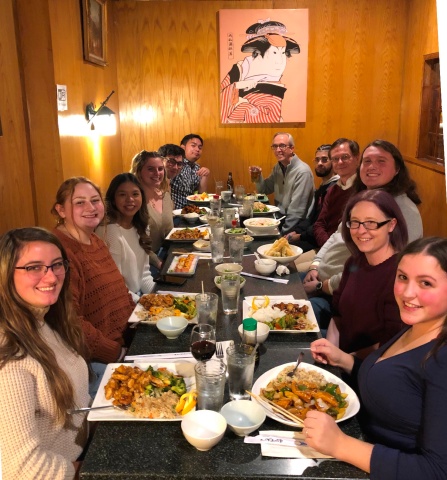
Students and faculty enjoying the annual History Dinner.
College of Arts and Sciences 2022 Outstanding Senior: Sarah Wack
Degree: History BA
Hometown: Buffalo, NY
What was your favorite course at UB?
I truly liked the Sexuality in America (HIS 241) course, I took my freshman year that kind of like really sold history for me at that point.
Do you have a particular memory that stands out from your time at UB?
I think when I went to my first Phi Alpha Theta meeting that was really nice. I was really nervous joining, but everyone was very welcoming.
Outside of the Department of History, what other activities do you do?
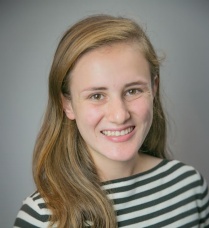
I'm coming up on finishing my third year with the writing center right now. I've been working there over the summers. I've been doing different internships, I was the education intern at the Jacobs Institute, which is a medical innovation center downtown. I take care of the high school students. I did a webinar with them before because of the pandemic, but I'm redoing the internship this summer, which is exciting.
I also worked with Upward Bound over the summer as a teaching assistant. I've been a little over the place, but my history background really prepared me to work with students.
Do you have any plans for after graduation?
Yes. I'll be in the Higher Education and Student Affairs MA program here at UB. I'll be working as a graduate assistant in the Career Design Center and I will be finishing my MA in History.
Two UB Alumni Honored at Mount Vernon Gala
Mark Boonshoft, BA 2010
David Head, MA 2002, PhD 2010
This past Spring two UB History alumni attended a black-tie gala at Mt. Vernon. Mark Boonshoft, PhD, and David Head, PhD, were honored as finalists for the George Washington Prize from the Washington Library. Mark was a finalist in 2021 for his book, Aristocratic Education and the Making of the American Republic. David was a finalist in 2020 for his book, A Crisis of Peace: George Washington, the Newburgh Conspiracy, and the Fate of the American Revolution (due to Covid delays award winners and finalists from the past three years were in attendance).
This gala, however, was not the first time the two had met. In fact, they had met at UB in 2007 when David was a TA for a US History course Mark was taking as an undergraduate. Mark was again David’s student in a 2008 American Revolution seminar. David recalls, “It was a small seminar, with maybe 20 students, held in some windowless basement room somewhere. I remember Mark writing some very sharp papers that blended together the arguments of the books we were reading while also advancing ideas of his own. That’s not something you see every day.” Although David did not teach Mark again before the two both graduated from their respective programs in 2010, they kept in touch, often crossing paths at conferences and of course on Twitter.
Being chosen as a finalist for the George Washington Prize is a high honor itself, but the presence of two UB alumni at the same gala, particularly two alumni with their unique past, made the event all the more memorable. David said of the event, “I was so happy to share the event with Mark. I was thrilled to be honored myself, of course, but it was extra special to see Mark getting recognized for his achievement.” Mark expressed, “It made for a good story during cocktail hour! More importantly, it’s a testament to the strength of UB’s history department—and the power of public higher education—that two alums were among the finalists within such a short time span.”
This fall Mark will take up a position as an Associate Professor and Conrad M. Hall ’65 Chair in American Constitutional History at Virginia Military Institute. David is currently an Associate Lecturer of History at the University of Central Florida.
Alumni Updates
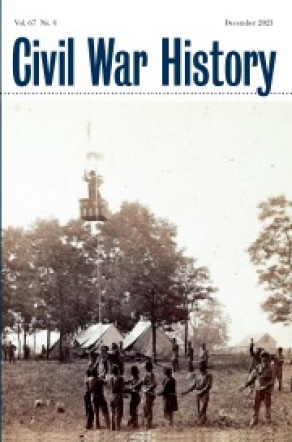
In November 2021, the journal Civil War History published an article by Richard D. Deverell, PhD (’21). He originally wrote the article as a research paper for Prof. Thornton’s research seminar in 2017. In February 2022, New York History published a book review he wrote about a film history monograph. Since graduating, he has worked as a temporary remote administrative assistant for Dr. Helena Hansen at UCLA and currently divides his time as a clerk at Walworth-Seely Public Library and as a Circulation Supervisor at St. John Fisher University’s Lavery Library. He will begin an online library science degree through UB this autumn.
Thomas Behr, PhD (‘00), was promoted and appointed Chair of the History Department at the University of St. Thomas.
Shanleigh Corrallo, PhD (‘20), was named an Empire State Fellow for 2021-2023, and had her article “Building Support for the Fight: Local Black Power Organizing During the Attica Prison Rebellion of 1971” published in the July 2021 volume of Afro-Americans in New York Life and History.
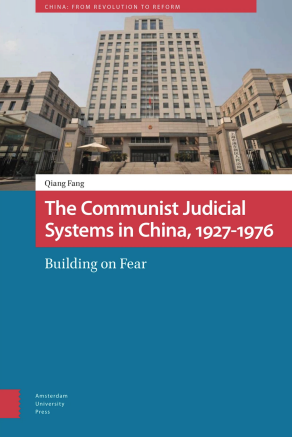
Qiang Fang, PhD (’06), was awarded the Chinese Historians in the United States’ 2022 Academic Excellence Award for his book The Communist Judicial System in China, 1927-1976: Building on Fear (Amsterdam University Press, April 2021).
Averill Earls, PhD (’16) was awarded the Judith R. Walkowitz Prize for Best Article in Gender & Sexuality History from the North American Conference on British Studies.
Jeannette Jones, PhD (’03), was a 2021-2022 UB Distinguished Visiting Professor. In September 2021 she presented on her current research, "Rethinking America in Africa: U.S. Expansion and the Scramble for Africa" to the department.
Alexandra Prince, PhD (‘20), published the article “‘Driven Insane by Eddyism’: Christian Science, Popular Psychopathology, and a Turn-of-the-Century Contest over Faith and Madness” in the November 2021 volume of Religion and American Culture.
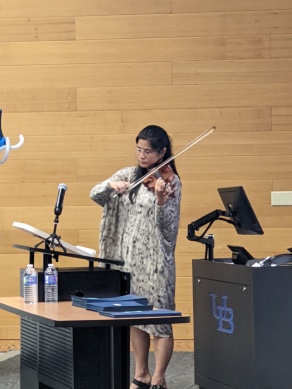
Yuki Numata Resnick playing the violin at the 2022 Graduation and Awards Ceremony.
Rick Mikulski, PhD (’14), is now a History librarian at William and Mary.
Craig Miller, PhD (’11), has been appointed Chief Reader for AP World History. In that position he will oversee the whole world history test, and he will help design the rubrics.
Jake Newsome, PhD (’16), recently published his first book with Cornell University Press: Pink Triangle Legacies: Coming Out in the Shadow of the Holocaust (2022). Jake, who works at the United States Holocaust Memorial Museum, has also developed various educational resources that help to explore the lives of LGBTQ+ people in Nazi Germany.
Marissa Rhodes, PhD (’19), is now an Assistant Professor of History at Saint Leo University in Tampa, Florida, in the history and medical humanities programs.
Shuko Tamao, PhD (‘20), is a Postdoctoral Fellow at the National Museum of American History.
Thank you for your support of the Department of History! With the support of alumni and friends, we can access vital resources to enhance our department and provide support for students, research projects, and programs. We are grateful for your generosity.
You can support your department and help to provide for our students by making a gift online.
